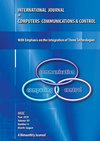基于深度强化学习的物联网数据处理与调度
IF 1.9
4区 计算机科学
Q3 AUTOMATION & CONTROL SYSTEMS
International Journal of Computers Communications & Control
Pub Date : 2023-10-30
DOI:10.15837/ijccc.2023.6.5998
引用次数: 0
摘要
随着物联网技术与信息技术的不断融合,边缘计算作为一种新兴的计算范式,充分利用终端对实时数据进行处理和分析。由于高延迟和可用性要求,物联网(IoT)设备的爆炸式增长给传统的基于云的数据处理模型带来了挑战。本文提出了一种新的基于边缘计算的框架,用于使用深度强化学习进行物联网数据处理和调度。该系统架构融合了分布式物联网数据访问、实时处理和基于深度q网络(DQN)的智能调度器。大量实验表明,与传统调度方法相比,平均任务完成时间缩短了20%,资源利用率提高了15%。边缘计算和深度强化学习的独特集成为低延迟物联网应用提供了灵活高效的平台。从测试提议的系统中获得的关键结果,例如减少任务完成时间和增加资源利用率。本文章由计算机程序翻译,如有差异,请以英文原文为准。
Iot Data Processing and Scheduling Based on Deep Reinforcement Learning
With the continuous integration of IoT technology and information technology, edge computing, as an emerging computing paradigm, makes full use of terminals to process and analyse real-time data. The explosion of Internet of Things (IoT) devices has created challenges for traditional cloud-based data processing models due to high latency and availability requirements. This paper proposes a new edge computation-based framework for iot data processing and scheduling using deep reinforcement learning. The system architecture incorporates distributed iot data access, realtime processing, and an intelligent scheduler based on Deep q networks (DQN). A large number of experiments show that compared with traditional scheduling methods, the average task completion time is reduced by 20% and resource utilization is increased by 15%. The unique integration of edge computing and deep reinforcement learning provides a flexible and efficient platform for lowlatency iot applications. Key results obtained from testing the proposed system, such as reduced task completion time and increased resource utilization.
求助全文
通过发布文献求助,成功后即可免费获取论文全文。
去求助
来源期刊
CiteScore
5.10
自引率
7.40%
发文量
55
审稿时长
6-12 weeks
期刊介绍:
International Journal of Computers Communications & Control is directed to the international communities of scientific researchers in computers, communications and control, from the universities, research units and industry. To differentiate from other similar journals, the editorial policy of IJCCC encourages the submission of original scientific papers that focus on the integration of the 3 "C" (Computing, Communications, Control).
In particular, the following topics are expected to be addressed by authors:
(1) Integrated solutions in computer-based control and communications;
(2) Computational intelligence methods & Soft computing (with particular emphasis on fuzzy logic-based methods, computing with words, ANN, evolutionary computing, collective/swarm intelligence);
(3) Advanced decision support systems (with particular emphasis on the usage of combined solvers and/or web technologies).

 求助内容:
求助内容: 应助结果提醒方式:
应助结果提醒方式:


